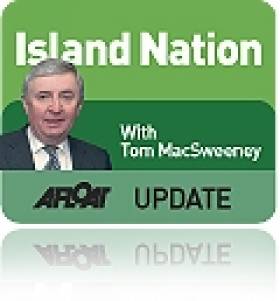Displaying items by tag: Anglo Irish Bank
Counting the Cost of New Fishing Boat Regulations
The cost of upgrading fishing boats to comply with new regulations first mooted three years ago means some boats cannot put to sea again. It's a move that will cost hundreds of jobs to coastal communities says Tom MacSweeney
The nation may be reeling from the revelations about Anglo Irish Bank and AIB. The fishing industry is reeling from another shocker. While earlier this week it cranked up its PR machine in an attempt to convince the public it was going to create jobs, the reality is that this Friday, October 1, it wiped out at least 200 and the overall effects of what it has done may throw as many as 800 people out of work in coastal areas.
That is callous disregard for people and underlines the disinterest and disrespect which the Government has for the maritime sector.
These jobs are in the fishing industry and are being lost because of a decision by the Department of Transport that smaller fishing boats, ranging in size from 15 to 24 metres must conform to the same safety standards as bigger boats, those over 25 metres, even though they operate under different fishing methods.
There can be no argument against safety, but there should be moderate, reasonable implementation of regulations. To quote the Taoiseach in his own recent defence, "moderation in all things." There are 99 boats in the Irish fleet in the 15-24 metre category. These are, effectively, day boats which operate in inshore waters, close to land. The Department has decided to implement regulations requiring them to conform to the same standards as bigger vessels that operate farther out to sea for extended periods.
Of the 99 boats nationwide faced with the implementation of the new regulations, 39 have not applied for certification, apparently because owners could either not afford the costs of upgrading the boats to the higher standard or felt the vessels would not be able to meet those standards, irrespective of how much money was spent on them. Those 39 boats have to be tied up, unable to go fishing any longer, another blow to the Irish fishing fleet. Their owners and crews will face unemployment.
The total number of jobs lost nationally could be up to 800, according to fishing organisations, when those whose livelihoods ashore depend on the 200 direct fishing jobs are added.
The Department makes the point that it has been known for three years that these new regulations would be imposed and that there has been ample time for owners to upgrade. Fishing organisations asked the Minister for Transport, Noel Dempsey, who also holds the brief of marine safety, to establish a separate category of safety requirements applying specifically to the smaller boats. Dempsey, who has not been a friend of the fishing industry, refused. So around 200 fishermen are out of work, directly due to a Government decision. It has not been explained why different regulations cannot be applied to different sizes of boats.
The sight of more Irish fishing boats tied to the quay wall, stopped by Irish Government regulations from working will not be pleasant.
• This article is reprinted by permission of the CORK EVENING ECHO in which Tom MacSweeney writes maritime columns twice weekly. Evening Echo website: www.eecho.ie





























































